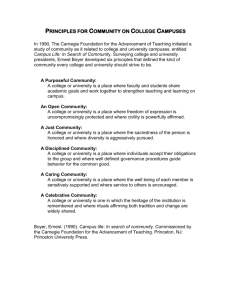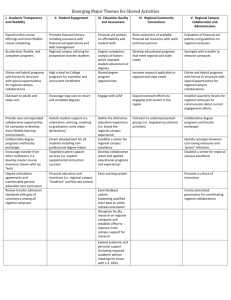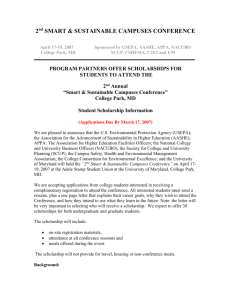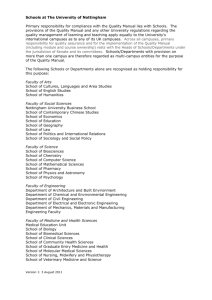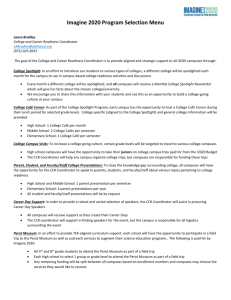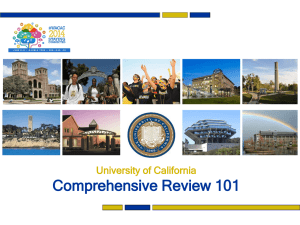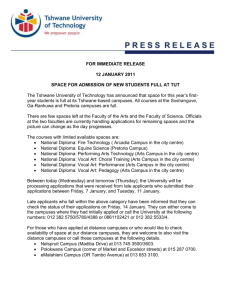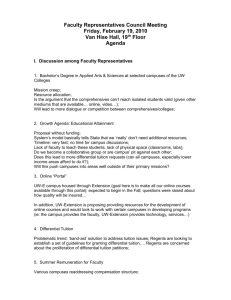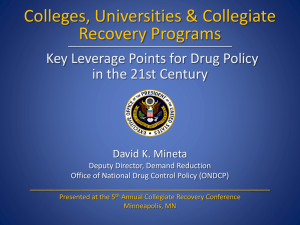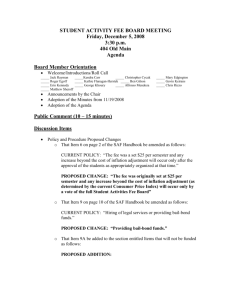Campus Compact Institutional Self
advertisement
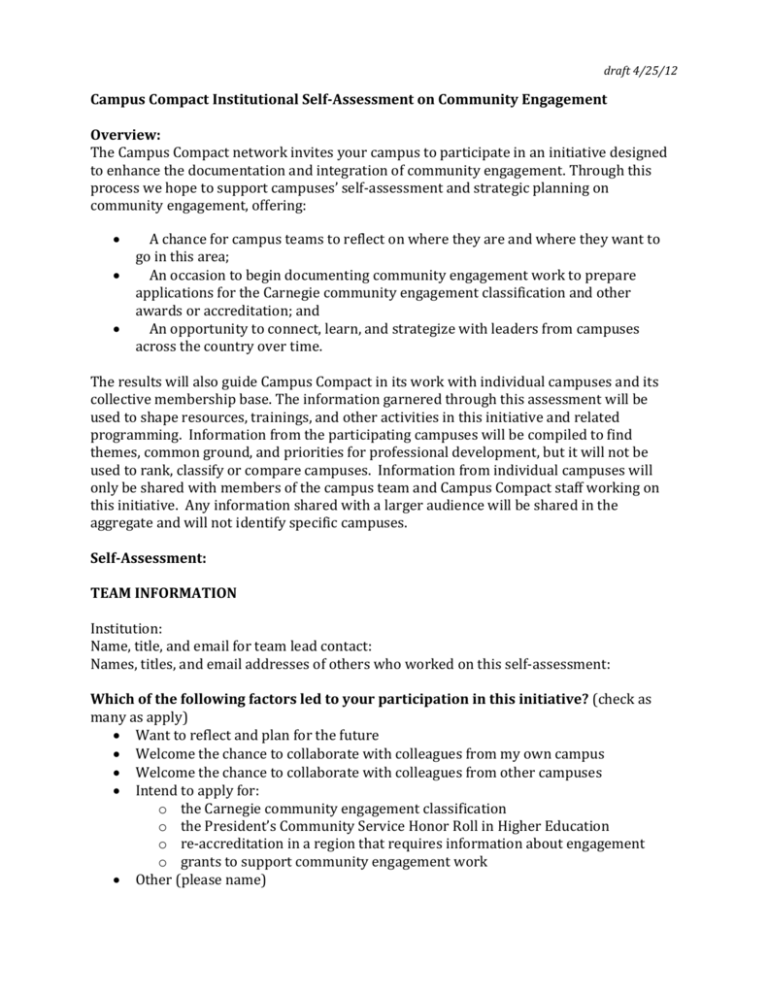
draft 4/25/12 Campus Compact Institutional Self-Assessment on Community Engagement Overview: The Campus Compact network invites your campus to participate in an initiative designed to enhance the documentation and integration of community engagement. Through this process we hope to support campuses’ self-assessment and strategic planning on community engagement, offering: A chance for campus teams to reflect on where they are and where they want to go in this area; An occasion to begin documenting community engagement work to prepare applications for the Carnegie community engagement classification and other awards or accreditation; and An opportunity to connect, learn, and strategize with leaders from campuses across the country over time. The results will also guide Campus Compact in its work with individual campuses and its collective membership base. The information garnered through this assessment will be used to shape resources, trainings, and other activities in this initiative and related programming. Information from the participating campuses will be compiled to find themes, common ground, and priorities for professional development, but it will not be used to rank, classify or compare campuses. Information from individual campuses will only be shared with members of the campus team and Campus Compact staff working on this initiative. Any information shared with a larger audience will be shared in the aggregate and will not identify specific campuses. Self-Assessment: TEAM INFORMATION Institution: Name, title, and email for team lead contact: Names, titles, and email addresses of others who worked on this self-assessment: Which of the following factors led to your participation in this initiative? (check as many as apply) Want to reflect and plan for the future Welcome the chance to collaborate with colleagues from my own campus Welcome the chance to collaborate with colleagues from other campuses Intend to apply for: o the Carnegie community engagement classification o the President’s Community Service Honor Roll in Higher Education o re-accreditation in a region that requires information about engagement o grants to support community engagement work Other (please name) draft 4/25/12 IDENTITY & OPERATIONS When answering questions in this section, please consider: To what extent community engagement is evident as a priority in your institution’s: o Mission statement (or vision); o Strategic plan; o Campus-wide awards and celebrations; o Marketing materials (e.g., website, alumni magazine, brochures); and o Senior administrators’ communications. To what extent your institution supports: o Leadership roles for students in community engagement; o Leadership roles for community members or partners; o Leadership roles for faculty; and o A coordinating infrastructure (center, office, etc.) with staff to support and advance community engagement. To what extent your institution has: o Internal budgetary allocations dedicated to supporting institutional engagement with community; o Dedicated external funding (or fundraising efforts) to supporting institutional engagement with community; o Professional development opportunities for faculty and/or staff who engage with community; o Search/recruitment policies that encourage the hiring of faculty and/or staff with expertise in and commitment to community engagement; o Faculty tenure and promotion policies that recognize community engagement in teaching and/or research, as well as service; and o Working relationships between student affairs and academic affairs on community engagement. What supports for community engagement are already in place? Where is there already work in progress to increase support? What additional work do you want/need to do to enhance community engagement as a core element of your institution’s identity and operations? What other people do you want/need to engage in that work? What external resources, trainings, or opportunities for networking and strategizing would be valuable to you in this area? draft 4/25/12 PROGRAMS When answering questions in this section, please consider: To what extent community engagement is integrated into: o Academic courses; o Majors, minors, or certificate programs; o General education requirements; o Internships/co-ops; o Work-study; o Student clubs/organizations; o Residence life; o Athletics; o Other co-curricular programs and activities; o Faculty research; and o Operation of facilities (e.g., library, gym, etc.). To what extent community engagement is aligned with other campus priorities and initiatives, such as: First-year programs; Learning communities; Student research; Diversity initiatives; Retention/student success efforts; and Study abroad. Whether your institution has: o A definition and/or standards for service-learning/curricular engagement with community; o Service-learning course designation; o Community engagement noted on student transcripts; o Institutional student learning outcomes for students’ curricular engagement with community; and o Departmental student learning outcomes for students’ curricular engagement with community. What are your existing strengths in curricular and co-curricular community engagement? What additional work do you want/need to do to enhance curricular and cocurricular community engagement? What other people do you want/need to engage in that work? What external resources, trainings, or opportunities for networking and strategizing would be valuable to you in this area? draft 4/25/12 ASSESSMENT When answering questions in this section, please consider: To what extent your current assessment practices meet the following purposes: o Track and record course- or program-specific engagement data; o Track and record institution-wide engagement data; o Assess community perceptions of institutional engagement; o Assess the impact of community engagement on students; o Assess the impact of community engagement on faculty; o Assess the impact of community engagement on the community; o Assess the impact of community engagement on the institution; o identify and assess student learning outcomes in curricular engagement; and o Provide ongoing feedback mechanisms to inform good practice and partnerships. What are your existing strengths in assessment? What additional work do you want/need to do in assessment? What other people do you want/need to engage in that work? What external resources, trainings, or opportunities for networking and strategizing would be valuable to you regarding assessment? PARTNERSHIPS When answering questions in this section, please consider: To what extent your current partnerships meet principles of good practice, including: o Ongoing commitment with particular partners; o Relationships of mutual trust and respect; o Shared vision, power, and resources; o Mutual benefit and reciprocity; o Mechanisms for regular assessment and feedback; and o Systematic communication. What do you consider your particular strengths regarding partnerships? What additional work do you want/need to do to strengthen partnerships? What other people do you want/need to engage in that work? draft 4/25/12 What external resources, trainings, or opportunities for networking and strategizing would be valuable to you regarding partnerships? OVERALL What do you consider your institution’s greatest strengths regarding community engagement? What are the major gaps or areas for development in community engagement at your institution? What do you consider the top priorities for enhancing community engagement efforts at your institutions over the next two years? As you work to enhance community engagement over the next two years, to what extent would you find value in the following (rate on a 1-7 scale, or not sure): State or regional gatherings in person; Webinars or conference calls; Campus visits; A virtual learning community with leaders from other campuses around the country; Opportunities for individual consultation; Online resources; and Other (please name). (If they rate the virtual learning community positively) What would you like to have in common with other members of a virtual learning community (e.g., representing a certain type of institution, prioritizing a certain issue to work on)?
